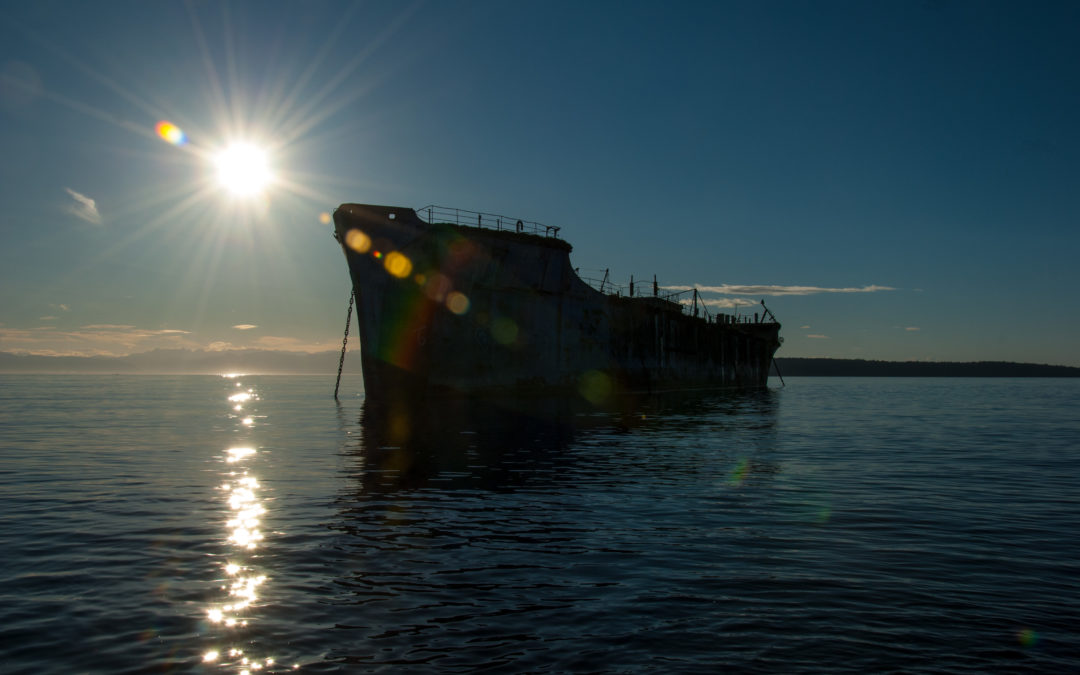I had almost given up hope it would happen in my lifetime. But I might just get to dive on a Powell River artificial reef before I’m too old to don a scuba tank.
Catalyst Paper, owners of the iconic Hulks, and the Artificial Reef Society of BC (ARSBC) issued a joint press release March 29, declaring that four of the 10 ships will be sunk as artificial reefs. The first should hit the bottom this year.
As a rookie reporter for the Powell River News in the early 1990s, covering Powell River’s attempts to get a ship sunk here as a scuba diving and marine life attraction was a highlight of my early career. Unlike incinerators and liquid waste management (other hot topics of the day), this was something I knew about. I’d been scuba diving since I was 12, and had I not gone into journalism and publishing, marine biology would have been my career track.
So being able to write about scuba diving and the benefits and drawbacks of ships placed underwater was my wheelhouse.
Over the years, I conducted countless interviews and attended myriads of meetings as Powell River tried to get ships. But the ships kept going elsewhere. First it was the HMCS Chaudiere, which ended up being sunk near Sechelt instead in 1992. Then the local dive community got serious about the HMCS Mackenzie, which went to Sidney in 1995, not too far from the ARSBC’s first project, the GB Church, a freighter that proved the benefits of sinking ships. Then in 1996 the HMCS Columbia was sunk near Campbell River and the HMCS Saskatchewan near Nanaimo a year later. Nanaimo got its second ship, the HMCS Cape Breton, in 2001. Powell River made a play for the HMCS Yukon, but the ARSBC sunk it off San Diego in 2000. At that point, the hopes of ever getting a ship here pretty much fizzled. Powell River didn’t even make serious attempts to get the Boeing 737 that was sunk off Chemainus, or the HMCS Annapolis, which was sunk off Gambier Island in 2015. The Powell River dive community got used to the sinking feeling, but not in the way they wanted.
This project has a different feel to it. The Hulks are Powell River’s ships. They’re not going somewhere else. Practically speaking, they probably couldn’t make the trip to another site. The Hulks are much smaller than the mighty destroyers the ARSBC has sunk elsewhere. But the plan to put four of them within easy scuba swimming distance of each other will make this project particularly attractive to divers. The ships will be sunk in 25-35 metres, likely about halfway between the mill and Willingdon Beach.
“This will be the most unique and creative marine habitat project ever undertaken by our Society and we are delighted to work with Catalyst throughout this process,” says ARSBC president Howie Robins. “Divers of all skill levels seek novelty and this will be a dive back into maritime history for adventure divers worldwide.”
“We are delighted to work with the Artificial Reef Society to re-purpose these historic concrete vessels, converting them into future productive marine reef systems,” says Fred Chinn, general manager of Catalyst’s Powell River Division. “This artificial reef has the potential to become a significant scuba dive tourism attraction for the City of Powell River, which will benefit our community and economy.”
The four ships planned for reefing were part of the mill’s 10-vessel breakwater. Fred says the mill operations no longer require YOGN-82, Emile N. Vidal, Quartz and S.S. Peralta. The YOGN-82 will be the first vessel prepared and sunk in 2017. It has already been moved out of the breakwater. The others will follow later.
“These wartime relics are already well past their life span, in essence they are already floating artificial reefs based on the generations of biodiversity on their hulls,” said Robins. “When fully submerged, these ships will form a pinnacle oasis for marine flora and fauna settlement with scale and habitat complexity.”
No doubt, many Powell Riverites will miss seeing the ships floating in the breakwater fleet, but for me, and many Powell River divers, their sinking has been a long time coming.
~ By Sean Percy, Powell River Living April 2017







